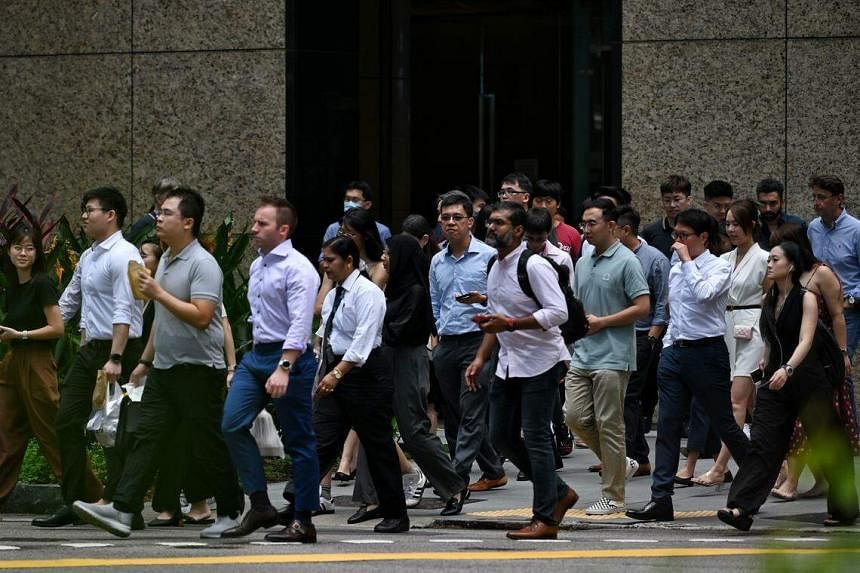SINGAPORE - Stronger action will be taken against those who enable the misuse of local SIM cards for criminal activity, and claiming ignorance will no longer be a valid defence, after the Law Enforcement and Other Matters Bill was passed on April 2.
Amendments to Singapore’s GST law were also passed in Parliament, after the Government discovered mistakes in goods and services tax (GST) collection in November 2023.
Here are key takeaways:
Stiffer laws against SIM card misuse
The Law Enforcement and Other Matters Bill was passed on April 2, introducing offences targeting errant telco subscribers, retailers and middlemen who misuse local SIM cards to facilitate scams.
There was a record high of over 46,000 scams in 2023, with victims losing about $651.8 million that year.
The Bill also makes amendments to enhance the police’s ability to apprehend people posing a safety risk to themselves and others, and to safeguard Yellow Ribbon Singapore’s symbols to prevent them from being misused under the guise of supporting former offenders.
Why it matters:
After the SMS Sender ID Registry was introduced in 2023, scams from SMSes fell by 70 per cent in the immediate three months. The authorities also worked with telecommunication companies to block incoming overseas calls that spoofed local numbers.
But scammers have adapted quickly, and pivoted to using local SIM cards to target victims instead, said Second Minister for Home Affairs Josephine Teo.
Mrs Teo said more than 23,000 local mobile lines were involved in scams and other cybercrimes in 2023, which is four times the number in 2021. About $400 million was lost in such cases in 2023, three times the amount lost in 2021.
A sampling study found that close to 80 per cent of local SIM cards misused for crime were registered with another person’s particulars, she said. Prior to the law change, police faced difficulty prosecuting such cases as the culprits could easily claim ignorance.
READ MORE HERE: Tougher laws for those who misuse SIM cards for scams, other crimes
MOF to publish list of non-taxable government fees
The GST Act has been amended to include a list of government services that will not be taxable. This is as the Government’s position is that fees imposed for control and regulation purposes should not be subject to the tax.
The list will include the 18 regulatory fees that were wrongly collected by the Government, which it had apologised for in February.
The Ministry of Finance (MOF) and the Inland Revenue Authority of Singapore will also work closely with agencies to assess their fees, instead of leaving it to them to decide.
Why it matters:
The move clarifies the rules around when GST should be charged for government services.
It comes after at least $7.5 million in GST was wrongly collected on fees for 18 government services, the Government said in February. Affected taxpayers are being refunded.
As a result of misclassification, GST was collected when people and businesses paid fees for these services, which include applying to operate a food processing company, registering a lasting power of attorney, and renting out an HDB flat or bedroom.
The mistake was first discovered in an internal review by MOF in November 2023. The ministry concluded the review in January 2024.
Employment figures scrutinised

Non-residents made up the bulk of total employment growth in 2023. Those holding work permits and other work passes, in sectors such as construction, made up over 77 per cent of this non-resident growth.
These are not jobs that Singaporeans typically want to do, noted Minister for Manpower Tan See Leng.
He was responding to a parliamentary question from Workers’ Party MP Gerald Giam (Aljunied GRC) on the Government’s efforts to promote job growth for Singapore citizens and residents, especially those aged 40 and above.
The remaining growth was from higher-skilled Employment Pass and S Pass holders, whose numbers have not yet recovered to pre-pandemic levels.
Dr Tan noted that the local workforce remains at close to full employment.
Why it matters:
The ratio of Singapore’s local to foreign workforce has consistently been a hot-button topic drawing scrutiny from both sides of the House.
Dr Tan said it is “myopic” to say that the Government had spent a significant amount to grow the economy, and then ask how many of these jobs end up with residents.
Given a tight labour market – with the resident long-term unemployment rate at 0.7 per cent – companies that can grow need to be able to access both foreign and local talent, he said.
The alternative, which is to dampen businesses’ ability to grow because Singapore is at close to full employment, is short-sighted, he added.
More emotive, challenging topics beyond Israel-Hamas conflict
Students will encounter more sensitive or emotive topics, such as geopolitical conflicts, in the future, and will need to learn to grapple with such issues and understand a diversity of perspectives within society, said Education Minister Chan Chun Sing.
Rolled out since February 2024, the character and citizenship education (CCE) lessons on the Israel-Hamas conflict had sparked discussion about how the topic had been taught and whether it should have been included.
In response to calls to make public the slides that were used in these lessons, Mr Chan reiterated that it is better for parents to discuss concerns with teachers, rather than release a deck of slides that can be taken out of context.
He said that while the Ministry of Education (MOE) did consult various stakeholders in coming up with the lesson content, it is ultimately a leadership decision whether to do the lesson.
Why it matters:
Heightened tensions and competing forces around the world underscore the need for a safe space for students to address challenging issues and verify information they come across online, said Mr Chan.
CCE lessons are one way of helping the young here understand differences in society, and where Singapore stands in terms of its priorities, positions and interests.
This includes a shared consensus to be united and not let others divide us, said Mr Chan.
To this end, MOE has said that it is working on better equipping teachers to tackle and explore complex issues with students.
If you have a few more minutes:
More vaping cases in Singapore
Vaping, which has been banned in Singapore since 2018, is on the rise here. The purchase, use or possession of vapes in 2023 jumped to about 7,900 cases, from about 5,000 cases in 2022 and 4,700 cases in 2021.
Vaping-related offences also climbed from 5,600 cases in 2022 to 8,000 cases in 2023.
Schools and institutes of higher learning have been ramping up education efforts to prevent vaping from gaining a foothold in Singapore.
Senior Parliamentary Secretary for Health Rahayu Mahzam said the authorities are continually monitoring the problem, and will adjust enforcement manpower according to the need.
No plan to tweak rental voucher, income cap for interim rental flat scheme
There are currently no plans to raise the $7,000 income cap for a scheme that provides temporary homes for families waiting for their Build-To-Order units, or the voucher amount to rent an HDB flat on the open market.
Second Minister for National Development Indranee Rajah said the $7,000 income ceiling under the Parenthood Provisional Housing Scheme (PPHS) targets support at families with less disposable income to rent on the open market.
The $300 PPHS voucher for those who instead opt to rent on the open market is “carefully calibrated” to provide some relief for eligible families, while mitigating its potentially inflationary impact on the rental market, she added.
Households with incomes above $7,000 a month that have additional expenses due to exceptional circumstances, such as high medical bills, can approach the Housing Board for help, she said.
Cyber security at international events
The Ministry of Defence (Mindef) takes a proactive approach to cyber security for high-profile international events in Singapore, such as those involving senior foreign dignitaries, said Senior Minister of State for Defence Heng Chee How.
These efforts include identifying an event’s digital footprint and cyber-security risk areas, and checking the event websites and the commercial systems used for the event. Any vulnerabilities uncovered will have to be resolved by organisers before the event, he said.
However, these measures do not include the cyber security of foreign militaries’ internal virtual meetings, he said.
Foreign guests who need to transmit sensitive information will typically arrange their own secured means, said Mr Heng.
He was replying to a parliamentary question that followed the interception and leak of a German general’s conference call while he was in town for the Singapore Airshow.


